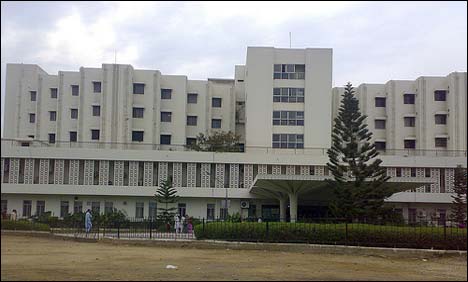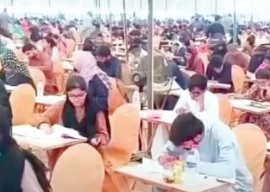
The National Institute of Cardiovascular Diseases (NICVD) is likely to lose its autonomous status as soon as the Sindh government passes the law to take over it. All the powers and functions of the board of trustees shall then vest in and be exercised by the governing body under the chairmanship of the chief minister of the province. "After this law, every member of the trust or this autonomous body will cease to hold office," proclaims the bill, prepared by the provincial government.
The governing body, headed by the chairperson, will comprise nine other members including the health secretary, health department's director-general, NICVD executive director, a nominee of the accountant-general of Pakistan, an elected mayor of the Karachi Metropolitan Corporation (KMC), a nominee of the Karachi Chamber of Commerce and Industry, a social worker and two other persons to be nominated by the government. The majority of the board members will be nominated by Sindh government itself.

Simply put, the government will now dominate the board's policies. The accounts of the institute will be maintained in a manner which the accountant-general of Sindh may determine in consultation with the government.
According to the law and parliamentary affairs minister, Dr Sikandar Mandhro, the 'National Institute of Cardiovascular Diseases (Sindh Administration) 2014' is being passed in view of the 18th Amendment, because the subject of health has now been devolved to the provincial governments. "Earlier, the NICVD was under the domain of the federal health minister. It now works under the Sindh government," he explained. "We just want to make the law to be able to regulate and control its affairs at the provincial level. The Sindh government will not interfere in its affairs and the institute will retain its autonomous position and governing body which will be independent to make any decisions," he said.
Contrary to the minister's claims, however, the bill which is likely to be passed in the next session of the assembly, states: "In discharging of its functions, the governing body shall be guided on questions of policy by the instructions given to it from time to time by the government. The governing body will be bound to carry out such directions."
What is ironic is that the legislation comes at a time when the issue of devolution of the NICVD is pending before the Sindh High Court as well as the Islamabad High Court. Post 18th Amendment, the employees of this institution had challenged the decision to hand it over to the Sindh government. "Our main demand is to retain the autonomous nature of this institution," claimed a senior official of the NICVD, speaking on the condition of anonymity. "We don't care if it comes under the Sindh government or the federal government. It should just work independently and be free of any political influence." Referring to the upcoming law, he said that the Sindh government wanted to grab all the powers. "But we will resist this move at every forum."
Around 900 permanent employees are currently employed by the NICVD that generates its own funds to run the prestigious cardiac hospital. This is in addition to the Rs700 million that is now given to it in grants by the Sindh government.
The status of the employees, however, is currently on deputation. "We are hanging in the balance as all promotions of employees have been suspended since the promulgation of the 18th Amendment on April 8, 2010," said Dr Malik Hameedullah, the NICVD's administrator.
According to him, they cannot take any important decisions and all matters are pending due to the absence of a governing body. "There are several vacant positions that cannot be filled with the approval of the governing body," he said. "Besides, administrative affairs have also come to a standstill." Malik added that the government had assured to address all their concerns through the legislation. He, however, put little hope in the legislation. "I have seen the draft of the bill. It is almost the same law under which we have been working prior to the devolution.
Legal experts, on the other hand, say that the law cannot be passed because the matter is sub judice. "Not only is the issue pending before the SHC, the Islamabad High Court has opposed the decision to hand over the institute to the Sindh government by declaring the notification null and void," said Azam Khan, the lawyer who is representing the NICVD employees in the case in the SHC. He added that the upcoming legislation will be questionable until and unless the court gives the verdict.
Published in The Express Tribune, November 3rd, 2014.























COMMENTS
Comments are moderated and generally will be posted if they are on-topic and not abusive.
For more information, please see our Comments FAQ